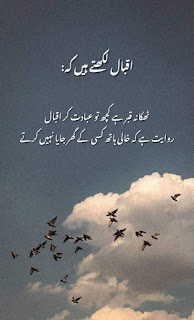Sad Quotes 2
Heartfelt Sad Urdu Quotes
About The Author
Mohammad Iqbal (1877-1938), a descendant of a Kashmiri Brahmin family that had embraced Islam in the seventeenth century, was born and settled in Sialkot. After a traditional education in Arabic, Persian, and Urdu, he was exposed to a liberal education that defined the contours of his thought and his poetry during the entire period of his life. Beginning his educational career at the Scottish Mission School, he went on to acquire his M. A. In Philosophy, before joining Trinity College, and later earning the degree of Bar-at-Law
He wrote many quotes in Urdu and Farsi Language that build your personality
He worked in different capacities at different points of time; he taught philosophy, practised law, got involved in politics, and also attended the second Round Table Conference.
پر کچھ لوگ ایسے بھی ہیں جو آپ جیسی زندگی جینے کے لئے ترستے ہیں
General Quotes
UNDERSTAND THE WHOLE OF LIFE
You must understand the whole of life, not just one part of it. That is why you must read, that is why you must look at the skies, why you must sing, dance and write poems, and suffer, and understand, for all that is life.
Krishnamurti: Why must you read? Just listen quietly. You never ask why you must play, why you must eat, why you must look at the river, why you are cruel – do you? You rebel and ask why you must do something only when you don’t like to do it. But reading, playing, laughing, being cruel, being good, seeing the river, the clouds – all this is part of life; and if you don’t know how to read, if you don’t know how to walk, if you are unable to appreciate the beauty of a leaf, you are not living. You must understand the whole of life, not just one little part of it. That is why you must read, that is why you must look at the skies, that is why you must sing, and dance, and write poems, and suffer, and understand; for all that is life.
You realise that you are the world and the world is you – not verbally but profoundly, the truth of it. You realise that and you realise, see the immense and imminent responsibility to change radically, because you have listened, not argued, not opinionated – you see the truth of it. Then what is your relationship with the rest of the world? When there is that fundamental transformation then what is your relationship with the world? What do you do? Or do you wait for something to happen? If you wait for something to happen, nothing will happen.
So, if you actually see the truth that you are the world and the world is you – not as a theory, a verbal assertion but an actuality and you see the extraordinary importance that when you basically transform yourself, you’ll affect the whole of consciousness of the world – bound to.
To bring about a good society, human beings have to change. You and I must find the energy, the impetus, the vitality to bring about this radical transformation of the mind, and that is not possible if we do not have enough energy. We need a great deal of energy to bring about a change within ourselves, but we waste our energy through conflict, through resistance, through conformity, through acceptance, through obedience. It is a waste of energy when we are trying to conform to a pattern. To conserve energy we must be aware of ourselves, how we dissipate energy. This is an age-long problem because most human beings are indolent; they would rather accept, obey, and follow. If we become aware of this indolence, this deep-rooted laziness, and try to quicken the mind and the heart, the intensity of it again becomes a conflict, which is also a waste of energy.
Our problem, one of the many that we have, is how to conserve this energy, the energy that is necessary for an explosion to take place in consciousness: an explosion that is not contrived, that is not put together by thought, but an explosion that occurs naturally when this energy is not wasted. Conflict in any form, at any level, at any depth of our being, is a waste of energy.






Comments
Post a Comment